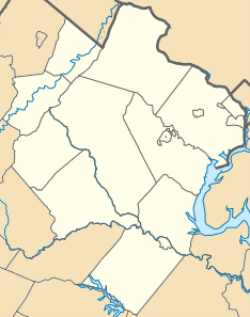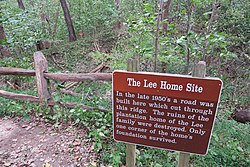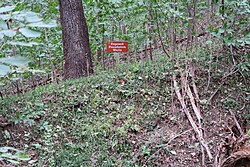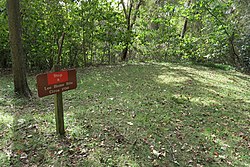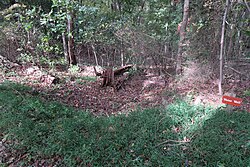Leesylvania (plantation)
Leesylvania | |
| Nearest city | Dumfries, Virginia |
|---|---|
| Coordinates | 38°35′23″N 77°15′31″W / 38.5896077°N 77.2585091°W |
| Built | c. 1750 |
| NRHP reference No. | 84003565[1] |
| VLR No. | 076-0045 |
| Significant dates | |
| Added to NRHP | September 13, 1984 |
| Designated VLR | June 19, 1984[2] |
Leesylvania was a plantation and historic home in Prince William County, Virginia. It was the home of Henry Lee II and his wife Lucy Grymes, who lived off the forced labor of at least 55 enslaved people. In addition to its prominent residents, the plantation was known at the time for its productive land and especially the quality of its tobacco. The Lees raised five boys and three girls at the home, most notably, Henry "Light-Horse Harry" Lee, Richard Bland Lee and Charles Lee.[3]
Today, only a small portion of the foundation of the house remains and is part of Leesylvania State Park. The house and its path were bulldozed in the 1950s to make way for a road. Lee and his wife are buried on the property, but their headstones were moved to the Union Cemetery in Leesburg in 1969.[4] The site and the cemetery are accessible by trail. The Leesylvania Archeological Site was listed on the National Register of Historic Places in 1984.[5]
History
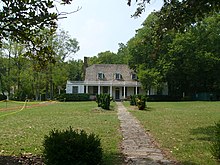
The original tract of land comprised four headright grants of 50 acres each, given for "each person transported into the 'Kingdom of Virginia'". In 1658, Henry Corbin acquired the land and deeded it to his daughter, Laetitia, to become hers upon coming of age or when she was married.[6] Selected in 1679 as a site for an English fort to defend against Indians, the earliest grave dates from 1690.[7]
When Richard "the Scholar" Lee II married Laetitia Corbin in 1675 he took ownership of the land along the Potomac River known as Freestone Point, which passed down through his son, Henry Lee I, to his grandson, Henry Lee II, who inherited the 2,000 acres that would become Leesylvania (Lee's Woods) in 1747.[8][9] Around 1750 he chose the site on a high ridge overlooking the Potomac River, which is believed to have been similar to nearby Rippon Lodge, which was built around the same time.[10]
Typical for plantations of the time, Leesylvania relied on slave labor. At the time of Lee's death in 1787, he owned 55 slaves who worked the property.[11] The plantation's main crops were tobacco, corn, wheat, and dairy products. There was also a commercial fishing operation.[12] In 1767, a enslaved man from Leesylvania named Harry, along with enslaved iron worker named Gawin from the nearby Neabsco Iron Works, attempted to poison Lucy Grymes.[13]

When Lee died in 1787, Leesylvania was left to his wife, Lucy, and then to their second son, Charles, upon her death in 1792. He conspicuously excluded his eldest son, "Light-Horse Harry", from inheriting most of his other properties, and any other belongings, including slaves, likely due to his history of poor financial decisions. The house had burnt down in 1790, and Charles mortgaged 2,040 acres to William Lee for a brief time.[14][15] It was sold by Lee II's grandson, Alfred, in 1825 to Captain Henry Fairfax. The chimney of the Fairfax home can still be seen in the park.[16]
What remained of the plantation house was destroyed in the 1950s when a road was constructed for the Freestone Point Resort. A small portion of the foundation is visible in its original location within Leesylvania State Park. A corner of the house is reconstructed in the Visitors Center, using sandstone from the property and bricks salvaged from the original site.[17]
Notable residents
- Henry Lee II - Built Leesylvania. Served in multiple positions in Prince William County and represented the county in the House of Burgesses. Participated in the Virginia Conventions of 1774, 1775, and 1776.
- Henry "Light-Horse Harry" Lee III - Born at Leesylvania (1756), the first child of Henry Lee II and Lucy Grymes. Notable cavalry commander in the American Revolution, Governor of Virginia, and Virginia Representative to the United States Congress. Father of Robert E. Lee.
- Charles Lee - Born at Leesylvania (1758), the second child of Henry Lee II. Third United States Attorney General. Represented William Marbury and other appointees of John Adams in Marbury v. Madison.
- Richard Bland Lee - Born at Leesylvania (1761), the third child of Henry Lee II. First member of the United States House of Representatives for Northern Virginia and part of the Compromise of 1790. Built Sully Plantation.
- Edmund Jennings Lee I - Born at Leesylvania (1772), the sixth child of Henry Lee II. Prominent politician in Alexandria, Virginia.
Current site
The ruins of Leesylvania are within current-day Leesylvania State Park and are accessible via the Lee's Woods Trail.
See also
- List of National Historic Landmarks in Virginia
- National Register of Historic Places listings in Prince William County, Virginia
References
- ^ "National Register Information System". National Register of Historic Places. National Park Service. July 9, 2010.
- ^ "Virginia Landmarks Register". Virginia Department of Historic Resources. Retrieved 5 June 2013.
- ^ Wall text, Henry Lee II, Leesylvania State Park, Woodbridge, VA
- ^ Sign at site of Lee & Fairfax Family Cemetery, Leesylvania State Park, Woodbridge, VA
- ^ (Staff). "Virginia Landmarks Register/National Register of Historic Places" (PDF). Virginia Department of Historic Resources. Retrieved December 17, 2016.
- ^ James R. Arnold, Leesylvania State Park (Northern Virginia Heritage, October 1985 (Vol. VII, No. 3))
- ^ Donald E. Curtis, The Curtis Collection: A Personal View of Prince William County History (Prince William, Virginia: Prince William County Historical Commission, 1988), 31.
- ^ Wayside, Leesylvania Plantation, Leesylvania State Park, Woodbridge, VA
- ^ Paul C. Nagel, The Lees of Virginia: Seven Generations of an American Family (New York: Oxford University Press, 1990), 158.
- ^ Wayside, Leesylvania Plantation, Leesylvania State Park, Woodbridge, VA
- ^ Wall text, Slavery at Leesylvania, Leesylvania State Park Visitors Center, Woodbridge, VA
- ^ Wall text, The 18th Century Leesylvania Plantation, Leesylvania State Park Visitors Center, Woodbridge, VA
- ^ Paul C. Nagel, The Lees of Virginia: Seven Generations of an American Family (New York: Oxford University Press, 1990), 159.
- ^ Wayside, Leesylvania Plantation, Leesylvania State Park, Woodbridge, VA
- ^ Paul C. Nagel, The Lees of Virginia: Seven Generations of an American Family (New York: Oxford University Press, 1990), 167.
- ^ Wayside, The Fairfax Family, Leesylvania State Park, Woodbridge, VA
- ^ Wall text, Corner of the Leesylvania Manor House, Leesylvania State Park Visitors Center, Woodbridge, VA
External links
- The History of the Prince William County Waterfront
- The Curtis Collection: A Personal View of Prince William County History
- Leesylvania (Ruins), State Route 610, Dumfries, Prince William County, VA: 2 photos at Historic American Buildings Survey
- Leesylvania State Park
- Find A Grave: Leesylvania Plantation Graveyard

